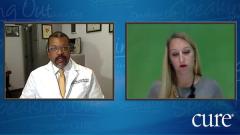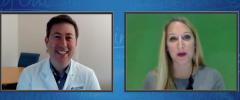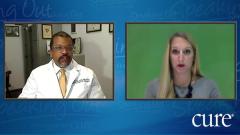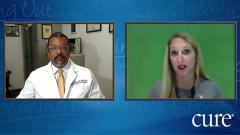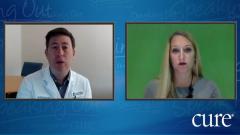
Genomic Alterations in Lung Cancer
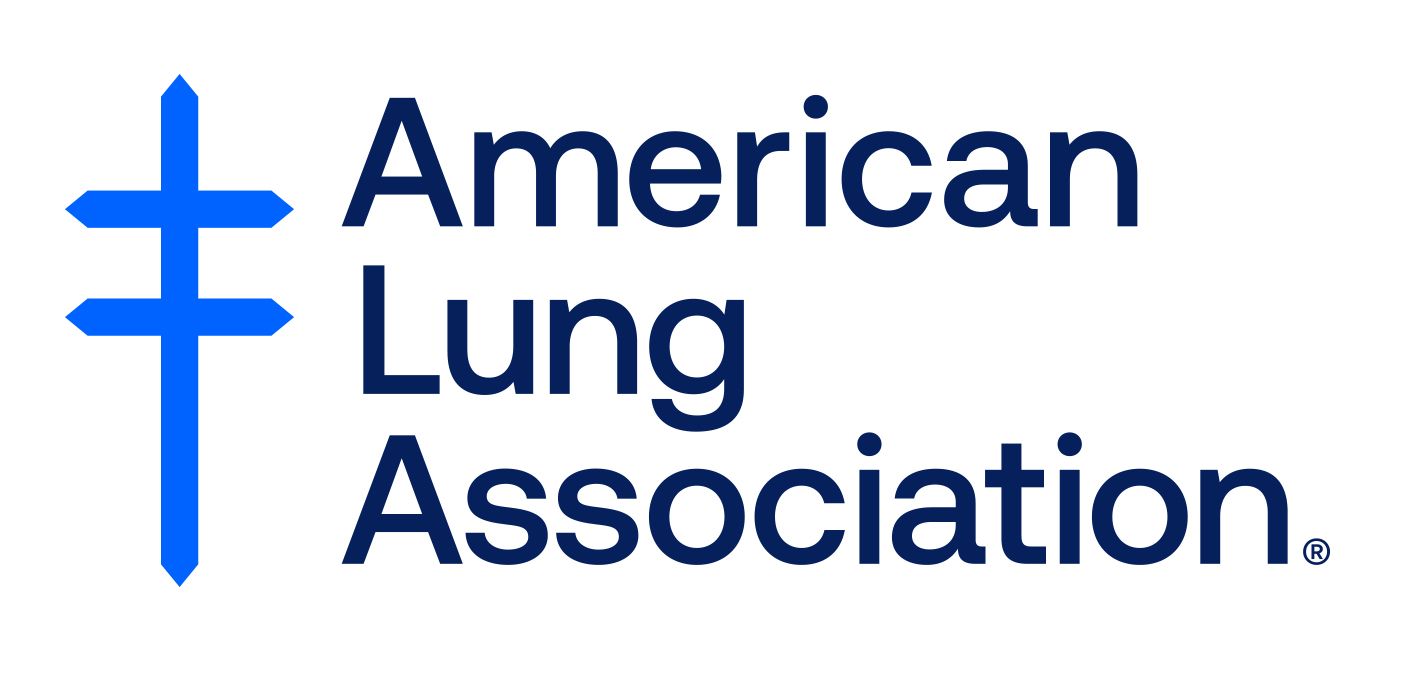
Kristie L. Kahl: There has been a lot that has come out in cancer DNA, can we discuss this a little bit first?
Dr. Jacob Sands: this is an important topic, I'm so glad that you're asking that as a starting point. So when we're talking about cancer DNA, that's different than the regular DNA. And what happens is that cancer develops through mutations and changes in the DNA of those cells. And then that's how they become cancer cells. Now, in lung cancer, it turns out that there are various specific mutations, or we say genomic alterations, because sometimes the DNA changes are different than specific mutations. So I'm going to say genomic alterations can be kind of broader. This is in the cancer DNA, we've found that there are these genomic alterations that occur, where we've developed a treatment to them in many cases. It's a pill that can really specifically target those cells with those specific genomic alterations.
Now, just to highlight some of what's gone on in lung cancer research, because it is astonishing from 11 years ago, was really the first big study that demonstrated that with a specific mutation, and these were EGFR mutations, that there was a pill then called gefitinib. In that case, that worked really well, much better than chemotherapy. And that was the first of now five approved drugs that target EGFR. And since then, in the last 11 years, we have EGFR, ALK, rOS1, BRAF v600e, RE, MET, and TRK. So there have been a lot that have been identified with effective targeted therapy for each of these.
This is now something that makes it extremely important that we really get the full genomic testing of cancers, prior to any treatment in the setting of when we're talking about stage 4, or metastatic disease. In that setting, we're considering what's going to be the best treatment for knocking the cancer back, for really prolonging and in some cases, improving people's quality of life. And so at the time of diagnosis, sometimes it can take a little longer, in some cases, weeks to get back that DNA analysis from the cancer cells. But it is extremely important because these targeted therapies really work better in many cases than the chemotherapies, and are often less toxic. And some of them work really well in the brain, also, so we can hold off on radiation. And it's a little bit different with each of these. But just to make the point that doing that DNA analysis of the cancer cells is overwhelmingly important when we're at the time of starting treatment.
Kristie L. Kahl: We’re hearing that lung cancer is being diagnosed at earlier ages. Is there any insight into why we’re seeing this?
Dr. Jacob Sands:There's a lot more awareness growing about this, which is wonderful because there needs to be awareness on this. There are multiple stories that are now known, who are young, who never smoked, and end up getting lung cancer. The impression of lung cancer, I think, for many years, has been someone who's older who smoked a lot. And the truth is that anybody who has longs can get lung cancer. So basically, anybody can get lung cancer.
Now, smoking rates have gone down, fortunately. And so the lung cancers diagnosed that are diagnosed have gone down. As far as younger people, this is still a very small number of people overall, who get lung cancer, but we're talking about people less than 30 years old. The numbers tend to be very, very low.
There was a study called the Genomics of Young Lung, looking at the younger population. I think in that study, it was 35 and younger, who got lung cancer. And in that study, we saw that the majority had some of these genomic alterations that can be targeted with targeted therapies. And that is kind of what we expect to see in younger people who never smoked. We expect there's a much higher likelihood of these genomic alterations that we can really target. And so that study really confirmed this. But the point also, it's important to make the point that even people who are older can have these genomic alterations. The oldest person I've treated was 92 years old, a woman who almost didn't even come to see me because people were telling her, “Hey, you don't want to go get chemotherapy, you're 92 years old.” And when I saw her, we talked about it, I sent off the genomics and she had an EGFR mutation, did really well on targeted therapy, improved her quality of life, got back to having wine with friends before dinner, and such and going to Bingo. So looking at this DNA is really important at all ages, but especially the younger population, it's even more important.
Kristie L. Kahl: How can we try to raise more awareness around these genomic alterations, so that patients understand how it will affect their treatment decisions?
Dr. Jacob Sands: Well, you're doing it with these questions, and just getting this information out there. So I really appreciate that. There was a report that amongst people with lung cancer throughout the country, it actually was surprising the number of people not getting the full DNA analysis of their tumors. Now, this is something that is standard of care and should be done for everybody. But not everybody is having that done. And on top of that, not everybody who has a genomic alteration is being treated with that targeted therapy also. And I think there are various factors that play into that.
One, when somebody gets diagnosed with lung cancer, understandably, they want to be on treatment immediately. And so they go to the oncologist and say, “Hey, let's start something right now.” And what I often tell people is first of all, let me say, if there are people who are having a lot of symptoms, sometimes people really need to be treated right now. And in those cases, I'll start chemotherapy alone. But in other people, the majority of people, we can still wait some weeks to get back all the data. And so what I often say to them is, “Listen, I want to do the full analysis so we can get you started on the best treatment, not just the first treatment.” And I think that statement resonates for a lot of people that, of course, people want to be on the best treatment.
Then others is that this is something we're continuing to talk throughout the country and really raise more awareness about the other thing is going and being seen at one of the major academic centers in the region, just getting a quick opinion. Has everything been done that really helps to not only make sure that all that testing has been done, but also a consideration for what clinical trials options might really be available. Because there are sometimes some really good options. I just want to highlight anybody with non-squamous non-small cell lung cancer, or adenocarcinoma, is the most common non-small cell lung cancer. Anybody with that diagnosis should get genomic testing. Anybody who didn't smoke in the past, whether that be squamous cell lung cancer, which is a non-small cell lung cancer, or even small cell lung cancer, individuals who've never smoked, should have all of that genomic testing done.
Kristie L. Kahl: What would you say is your biggest piece of advice for a patient who is newly diagnosed with lung cancer?
Dr. Jacob Sands: So, getting a second opinion is a good way of just making sure that you really are aware of all of your options, but making sure that you talk to your physician about genomic testing. If you're somebody who never smoked, it is right for you. If you're somebody with nonsquamous non-small cell lung cancer, or adenocarcinoma, then genomic testing is right for you. The other thing is making sure that they got an extensive panel of these. So you want to make sure that all of the genomics for any approved therapies has been done.
Now, that is a minimum, I would also advocate really that doing a broader panel gets more information, which maybe doesn't have FDA approved options right now, but does have clinical trials options right now. At the same time, there may be trials that come up down the line that that one is eligible for, and I have a couple of people who had their tumors had a RET fusion. At the time that I did their initial testing, that was not a thing. We now have two FDA approved drugs that were approved this year, and patients that went on trial, because at the time that that trial started all of a sudden, you know, we found out these patients are eligible, but at the time of the initial testing, that that wasn't a thing. So a broader panel not only captures anything that is an option right now, but as things advanced down the line, other options may become available that aren't currently.
Racial Disparities in Lung Cancer
Kristie L. Kahl and Dr. David Cooke
6210475677001
Kristie L. Kahl: Can you discuss what the rate of lung cancer diagnosis is, in particular amongst African Americans?
Dr. David Cooke: Lung cancer is the number one cancer killer of all Americans. It kills more men and women than breast cancer, colon cancer and prostate cancer combined. But also lung cancer is the number one cancer killer for blacks, African Americans as well.
Kristie L. Kahl: On the plus side, we have seen that these rates are dropping faster compared to white patients, since 1990. So what can we attribute to these rates dropping faster?
Dr. David Cooke: Well, luckily, lung cancer mortality has decreased in the last several years. We see that in the report from the American Cancer Society journal, where we see mortality decreasing. Over the past decade or so, in the upcoming 2020 American Lung Association State of Lung Cancer report. We also have evidence that cancer mortality has been decreasing. And that's been lung cancer-specific mortality decreasing across the board, both for Black African Americans, as well as for white Americans as well. However, the rate of lung cancer death is still higher in communities of color, specifically Black and African Americans compared to white Americans. And there are reasons for that.
On the positive side, the reasons for the decrease in mortality for lung cancer is multifactorial. We have things like lung cancer screening, we have interventions such as a smoking cessation programs, policy measures throughout our regions for increasing the age of tobacco use, from 18 to 21, and also flavored tobacco bans in our communities. In regards to therapies, we have better surgery, more minimally invasive surgery, and now about 80% of board certified thoracic surgeons who are doing long resection for cancer, about 80% of those cases are done minimally invasively. And we have new, really exciting therapeutics, specifically in precision medicine, as well as immunotherapy. When you take the constellation of those interventions, we see a decrease in mortality. However, when we look at our Black African American communities, we find that those communities are diagnosed at later stages are less likely to undergo lung cancer screening, and less likely to go specific therapeutic interventions such as surgery and enrollment into therapy to clinical trials.
Kristie L. Kahl: What are we kind of doing to negate these challenges moving forward?
Dr. David Cooke: One thing that is important for us to understand is that race, ethnicity is a social construct and not a genetic manifestation. So when we look at those disparities, we have to look at our health care structure, and how is that health care structure providing access to people of color. And what we find is that if you take something like lung cancer screening per se, the American Lung Association in lung cancer report shows in 2019, that only of the 8 million Americans, regardless of race, who are eligible for lung cancer screening, only about 4% gets screened. And that varies between states. So for instance, where I practice in the state of California, only 2% of eligible Californians get screened. When you compare that to mammography for breast cancer, about 70% of women are eligible for breast cancer get screened. Their upcoming 2020 report that lung cancer screening number will be a little bit higher than 4%. But still markedly lower than what it should be. And we do know that African Americans are screened less than white Americans. So how can we fix that?
One is through education of our care providers. In the American Lung Association’s lung barometer, it found only 15% of individuals knew that lung cancer screening was an essential health benefit to them. And so we need to empower our primary care providers to enroll their patients into lung cancer screening. Also, patients themselves need to understand that this is a benefit for them. At UC Davis Comprehensive Cancer Center, we partnered with private industry to really increase that awareness amongst our African American communities in our Sacramento region, and that includes billboards on highways and roads in the African American communities, and also advertisements in areas such as public transportation, as we know that people of color utilize public transportation more than other communities as well. So those type of interventions, lung cancer screening is just one example. Another example, in how can we reduce those disparities, is really on the policy side. For instance, in our Sacramento area, we had legislation that banned flavored tobacco products. And we do know that the tobacco industry has targeted the African American community with flavored tobacco, specifically menthol. And the idea is that banning those flavored products not only helps our youth, but also helps our targeted communities of color.
Kristie L. Kahl: What would you say is your biggest piece of advice for an individual who may be facing any of these challenges with access to care?
Dr. David Cooke: Ask your care provider, “What's the standard of care treatment for me?” If you are a former smoker, ask your care provider, “Can I undergo lung cancer screening with a low dose CT scan?” If you're diagnosed with lung cancer, ask your care provider, “Is there a clinical trial that's open to me?” And if it's not open at the at the center that you're being treated, “Where near me? Are there clinical trials that could benefit for me? Am I a surgical candidate? Can I undergo surgery to remove this lung cancer from my body?”
So, really be well informed. And there's many ways for our communities to be well informed. They could go to the American Lung Association website, lung.org, they could go to the National Cancer Institute's website, cancer.gov, or they could look to see if there's a comprehensive cancer center within their community and seek to obtain care at that center of excellence.

